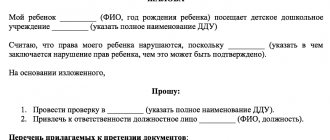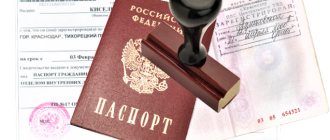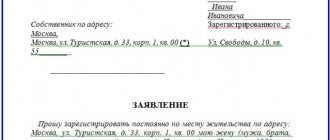Can a temporarily registered person claim your apartment?
This is impossible, since temporary registration (as well as permanent registration) does not give him the right of ownership of real estate. Of all the powers that make up the right of ownership, a person with non-permanent registration has only one - the right to use. That is, he can be and live in an apartment, but nothing more.
He has no right to sell, use as collateral for obtaining a loan or otherwise dispose of the housing in which he is registered. Even if we imagine (purely theoretically) that the new tenant came up with such an idea, it will not be possible to implement it for the following reasons:
- he does not have documents for the apartment confirming ownership;
- even if his counterparty agreed to conclude a deal without these documents, it will still be considered invalid from the moment of its conclusion and will not create any legal consequences.
Because of this, the owner does not bear any property risks if he decides to temporarily register someone in his living space.
What does it threaten the owner financially?
One of the serious disadvantages of an extra registered person is the increase in utility bills:
If there are meters
If you have meters for water, gas, electricity, then the amount will increase in proportion to the volume of resources consumed.
Example: The Solomin family - husband, wife and their child consumed 8 cubic meters of cold water and 5 cubic meters of hot water per month. According to tariffs for the Western Administrative District of Moscow, they paid:
- for hot water - 151.36 rubles/cub.m. x 5 cubic meters = 756.8 r;
- for cold - 30.87 rubles/cub.m. x 8 cubic meters = 246.96 rub.
After Solomina A.A. I temporarily registered my friend Ivanenko G.V., water consumption along with the amount of payments increased:
- for hot water – 151.36 rubles/cub.m. x 6 rubles = 908.16 rubles;
- for cold – 30.87 rubles/cub.m. x 10 cubic meters = 308.7 rub.
If there are no meters
Then the payment is calculated according to the number of registered people in the apartment, which is even more expensive.
Example: General standards for water consumption per person are set in the following sizes: cold - 6 cubic meters, hot - 3 cubic meters per month. This means that after obtaining a temporary registration for G.V. Ivanenko, the Solomin family will pay for 4 people, and not for 3, that is, 6 cubic meters more for cold water and 3 more for hot water.
To prevent such consequences for the apartment owner from turning into a big minus, it would be rational to initially discuss this point with the temporary tenant. Typically, the tenant and the owner enter into a rental agreement, which stipulates the procedure for paying for utilities. If you do this, then such registration should in no way affect your finances.
Rules for drawing up an application
The owner's consent must include the following information::
- The name of the registration authority to which the application is sent.
- Information about the owner of the property - last name, first name, patronymic in full, residential and email address, contact phone number, series, number and date of issue of passport, date, month and year of birth.
- Place of registration of consent.
- Registration address of the owner himself.
- Data of the registering person - last name, first name, patronymic in full, series, number and date of issue of the passport, date, month and year of birth.
- Owner's consent.
- Address of the apartment where the person will be registered.
- Date of document execution.
- Owner's signature.
At the end there must be a certification from the notary or specialist who accepted the application.
Find out how to apply for temporary registration here.
Is it possible to temporarily register a child without the knowledge of the owner?
One of the most unexpected surprises may be that instead of one temporarily registered person, there may be several of them in your living space. This can happen if you have registered a woman with a minor child.
In this case, the child’s registration may be issued without your consent. And it will not even be possible to challenge this fact in the future, since Government Decree No. 713 of January 17, 1995 clearly protects minors. Clause 12 states that registration of children under 14 years of age is carried out at their place of residence:
- parents;
- adoptive parents;
- guardians.
In this case, it is carried out regardless of the consent of the following persons:
- tenants of housing in state fund houses;
- private owners, if the housing is privatized;
- boards of housing cooperatives, if they are the owners of the housing.
If a minor is temporarily registered in your home, this may become a reason for manipulation on the part of his mother (father, guardian, adoptive parent). The fact is that the exact periods for which children can be registered at the place of residence of their parents are not determined by law. According to the rules, they are registered simultaneously with them and for the same period.
However, if registration occurred later, then due to the inattention of the migration department employees, the period of temporary registration may be longer than that of the parent himself. This situation is fraught with the fact that a non-permanently living parent can obtain an extension of his registration through the court - do not leave the child alone in a “strange” apartment, and only then renew the child’s registration for a longer period. But this series of frauds can be stopped.
- Step 1. Go to court. And although the law is entirely on the side of the child, having a sufficient evidence base in hand, it is possible to prove that the child is only a cover for committing a fraud with temporary registration. If you succeed, the child’s temporary registration will be cancelled.
- Step 2. Upon expiration of any registration period (parent or child), together with the resident person, appear in person at the migration department and monitor the determination of the future registration period.
Example : Antonova V.I.
was registered for six months in the apartment of L.V. Vozny. A month later, she independently registered her 11-year-old daughter in this living space for a period of 6 months. Thus, her registration ended earlier than her daughter’s. She could have gone to court to oblige the property owner to extend her registration for another month, but Vozny L.V. proposed a more profitable and time-saving solution for himself - to voluntarily register her with the migration service for another 1 month. But I was already present during this registration in person, so I independently verified the expiration dates of registrations in order to avoid similar incidents in the future.
How much does registration cost in Moscow?
For temporary registration within Moscow, intermediaries charge from 600 rubles to 800 rubles when registering a person for a period of 3 months, and 800 rubles - 8 thousand rubles when registering for 6 months. For a year, real estate services will cost from 1 thousand rubles to 16 thousand rubles, depending on the area of registration.
The price of registration is due to the fact that its presence is mandatory for staying in the capital on a legal basis. Lack of registration can lead to the imposition of penalties for citizens of the Russian Federation, and for foreigners the threat of deportation and an entry ban.
Is it possible to sell an apartment with a temporary registration?
Theoretically, it is possible to sell an apartment with temporary residents registered in it (since an extract from the house register is now not required when registering a transaction), and the consent of the latter is not required for this. But in practice it is unlikely, since few people will want to buy such an apartment, because it is burdened with the registration of strangers. This means that after purchasing housing, the new owners will have to share it with strangers, since they have the right to use it.
For the seller
Although there is still one guaranteed way that will help sell an apartment with an encumbrance in the form of a non-permanent registration. This is an application to a real estate agency that specializes in the sale of “problem” housing. Such agencies buy apartments at almost half the price of their market value, or undertake to find a suitable client, charging 40-50% of the transaction cost for their services.
For the buyer
Before purchasing, the buyer should carefully study the contract and request from the seller an extract from the house register, where all registered persons are indicated (i.e., so that there are no registered persons). Because there are often cases when a transaction has already been completed, and later it turns out that someone else is registered in the purchased property. But even if you happen to buy encumbered real estate, there is always a way out.
- Option 1. Forcibly evict temporarily registered persons from their apartment by filing a lawsuit in court.
- Option 2. Again - through the court - but using a different procedure. You need to ask that the transaction be declared void if the contract did not say anything about temporary residents registered at your address. If the demands are satisfied, it means that the apartment is returned to the seller, and the money is returned to the buyer.
Advantages and disadvantages
Temporary registration has both pros and cons for both parties. They are presented in the table.
| For registered person | For the home owner | |
| pros |
|
|
| Minuses |
|
|
The responsibility for temporary registration lies with both the person who changed his place of residence and the owner of the property. It is important that the parties agree on all the conditions of this procedure in advance and put them in writing. This will help avoid misunderstandings and possible negative consequences.
Additional disadvantages of such registration for the owner
| Situation | Consequences |
| Temporary resident takes out a loan | Bank representatives and collectors will look for him at your address |
| Tenant commits a crime | The police will visit you first and it is even possible that you will have to be a witness in the case or, worse, an accomplice |
| The person registered with you is evading conscription into the army. | Summons will be sent to your address, and military registration and enlistment office employees may even think that you are hiding a conscript |
| The temporarily registered resident has a car | All his fines and notices of administrative violations on the roads will be sent to you |
| The tenant leads an immoral lifestyle | The most unexpected - from constant noise, drunkenness and scandals with the owner to illegal actions directed at him |
Can the owner of a private house temporarily register someone with him?
Yes, this procedure is no different from registering an apartment - it is carried out according to the same rules and in the same order. The tenant and the owner acquire a similar scope of rights and obligations. The only difference is that the migration department may require an extract from the house register to the “apartment” list of documents for registration:
- formal application;
- passport of the temporarily registered person;
- certificate of ownership or lease agreement, or written permission from the owner to register.
However, registration will not be possible if the house:
- not put into operation (no corresponding act);
- built on lands not intended for individual housing construction;
- documented as a dacha;
- is joint property and its shares are not allocated in kind unless there is consent to registration from the co-owners.
How are utility bills calculated?
The formation of payments for housing and communal services is regulated by the Housing Code of the Russian Federation. It contains a list of services for which residents are required to pay rent:
cold and hot water supply;- electricity;
- heating;
- gas supply;
- sewerage;
- additional services - intercom, elevator maintenance, major repairs, garbage removal.
The Housing Code of the Russian Federation also states that people registered in an apartment are required to pay utility bills on time and in full. These responsibilities lie not only with the owner, but also with the rest of the people living in the apartment. For failure to comply with these obligations, residents may be subject to fines or other measures prescribed by law.
Registration for refugees and military personnel: does their status affect the owner of the home?
Resolution No. 713 states that the temporary registration of refugees and military personnel is carried out according to the usual rules, that is, their “special” status does not affect the rights and obligations of both parties. But at the same time, there is a caveat for each category. Thus, registration is carried out as usual if:
- refugees received the status of forced migrants;
- military personnel are contract soldiers, not conscripts.
Temporary registration will not be required at all for those military personnel who are on a business trip or vacation.
Possible positive aspects for the owner
Registration of tenants is an undeniable advantage for him, since it will allow him to avoid possible problems with the tax authorities. They may arise due to the fact that if the owner who rents out the apartment does not want to register the tenant at the place of residence, the latter can apply to the migration department of the Ministry of Internal Affairs or the court with demands for forced registration.
The owner will immediately be interested in the tax authorities regarding evasion of personal income tax in the amount of 13% of the rent amount. If the tax inspectorate manages to prove that the apartment is for rent, you will have to pay the tax itself, a fine of 20% of the unpaid tax amount and a penalty.
In addition, if the owner allows a citizen of the Russian Federation to live in his apartment without registration, it constitutes an administrative violation. According to Art. 19.15.1 of the Code of Administrative Offenses of the Russian Federation for him the court may order:
- fine from 2000 - 5000 rubles
- in Moscow or St. Petersburg - from 5000 - 7000 rubles .
Disadvantages of temporary registration: can the owner avoid them?
Despite the fact that temporary registration does not give practically any rights to the tenant, it can still adversely affect the owner’s usual rhythm of life. However, if he follows the advice below, he will be able to minimize the risks:
- registration should be issued for the shortest possible period;
- It is advisable to be present in person during the registration procedure to control the completion of the application (especially the column with the registration deadline);
- You should only register those people you know well (although this is not always a guarantee that you will not have disagreements with them in the future).
How to resolve the conflict between the owner and the temporarily registered person?
If during a conflict it is not possible to reach an agreement peacefully and the registered person does not agree to be discharged, there is only one way out - forced discharge through the court. To do this, the owner must:
- apply to the magistrate’s court at your place of residence with a claim for forced eviction;
- provide the court with facts confirming the need for eviction: violation of public order by such a tenant;
- neglect of sanitary standards;
- refusal to pay for utility services;
- long-term residence at another address.
If you refuse voluntary execution, you should contact the bailiffs, who ensure the enforcement of the court decision.
Links to legislative acts
- Clause 2, Article 20 of the Civil Code of the Russian Federation. Citizen's place of residence
- Article 5 of the Law of the Russian Federation “On the right of citizens of the Russian Federation to freedom of movement, choice of place of stay and residence within the Russian Federation.” Registration of a citizen of the Russian Federation at the place of stay and deregistration of a citizen of the Russian Federation at the place of stay
- Part 1, Article 17 of the RF Housing Code. Purpose of living space and limits of its use. Use of residential premises
- Part 2, Article 30 of the RF Housing Code. Rights and obligations of the owner of a residential premises
- Part 4, Article 31 of the RF Housing Code. Rights and obligations of citizens living together with the owner in residential premises belonging to him
- Article 35 of the RF Housing Code. Eviction of a citizen whose right to use residential premises has been terminated or who violates the rules for using residential premises
- Clauses 2.4, Article 292 of the Civil Code of the Russian Federation. Rights of family members of residential premises owners
- Clause 1, Article 558 of the Civil Code of the Russian Federation. Features of the sale of residential premises
- Article 23 of the Federal Law “On migration registration of foreign citizens and stateless persons in the Russian Federation.” Grounds and procedure for deregistration of foreign citizens at the place of stay
- Clauses 9, 10, 11, 12, 14, 15, 28, 29 of the Decree of the Government of the Russian Federation of July 17, 1995 No. 713 “On approval of the Rules for registration and deregistration of citizens of the Russian Federation at the place of stay and place of residence within the Russian Federation »
Why is temporary registration needed and what does it provide?
Temporary registration is a procedure for officially assigning a person to a place of residence that is not his main place, that is, at his place of stay.
Official registration at the actual place of residence gives a person the following rights:
- get officially employed;
- receive free medical care;
- register a child for kindergarten or school;
- receive government services that are provided at the place of residence (replacement of documents, etc.).
Obtaining a temporary registration allows you to avoid fines. While it can be completed free of charge, penalties for lack of temporary registration can amount to 1,500-2,000 rubles.











